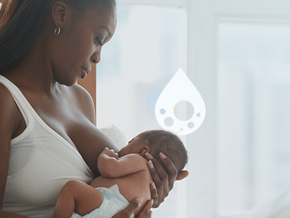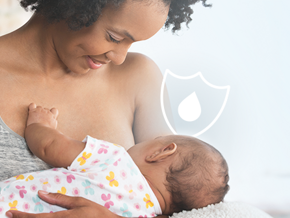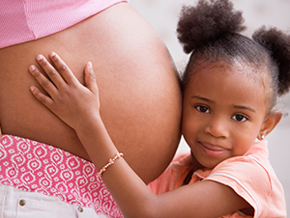
The benefits of breastfeeding
Even before your baby makes her grand entrance, you may have noticed changes in your breasts. This is your body preparing to breastfeed.
Even before your baby makes her grand entrance, you may have noticed changes in your breasts. This is your body preparing to breastfeed. Understanding what these changes mean and how the act of breastfeeding benefits you and your baby’s health is the key for many women. Here are some benefits, which may have a special meaning to you when thinking about breastfeeding.
Breastmilk has everything your little one needs to grow healthy—and offers benefits for you, too.
Benefits for baby
Breastmilk is nature’s perfect food for your baby. Here’s why:
- Breastmilk evolves as your baby’s nutritional needs change. For the first 3 to 4 days, your breasts produce a thick, yellow milk called colostrum, or first milk. It’s concentrated with antibodies and proteins to protect your baby’s newborn intestines and provide a type of natural immunization.
- Breastmilk naturally has the perfect proportions of proteins, carbohydrates and fats to meet your baby’s energy needs.
- The fat in breastmilk is rich in omega fatty acids, DHA and ARA, which help to support healthy brain and eye development during the first few years of life.
It’s easily digested and absorbed
- The hundreds of nutrients in breastmilk foster the healthiest environment for your baby’s digestive system.
- Unlike proteins found in regular cow’s milk and most formulas, the proteins in breastmilk are naturally gentle and easy to digest.
It offers protection:
- It helps protect her against early food allergies, protein intolerance, and sensitivity.
- Breastmilk contains antibodies and other components that help reduce the risk of infection such as ear infections and pneumonia.
- Healthy bacteria (bifidobacteria and lactobacilli)—called probiotics—in breastmilk have a positive influence on digestive function and immune support.
Benefits for mom
Breastfeeding is good for health, too. Here’s why:
Lessens future health risks
- Decreased risk of developing Type 2 diabetes, breast cancer and ovarian cancer later on in life.
Breastfeeding hormones like oxytocin cut down your recovery time
- The act of breastfeeding triggers the release of oxytocin, which helps the uterus to contract and return to its prepregnancy size in less time.
- It also triggers improved blood clotting, which reduces the amount of postpartum initial bleeding after childbirth.
Promotes reduced stress and has a calming affect
- Hormones stimulated by the physical contact with your baby and production of breastmilk help you relax and feel calmer.
- This positive mood enhancer has been linked to decreased risks of post-partum depression.
Helps you bond and read your baby’s cues
- Escape the hustle and bustle together.
- Relax with your baby and observe how she communicates.
- Skin-to-skin and eye-to-eye contact provides a unique closeness.
Inexpensive, convenient and naturally made
- Requires little to no equipment.
- Can be done almost anywhere and anytime.
















